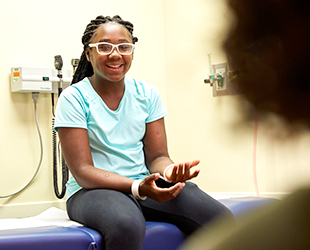Depression Questionnaire Provides Alert for Timely Intervention

Depression and suicidal ideation among adolescents with Type 1 diabetes are higher than in the general adolescent population. Cincinnati Children’s Diabetes Center has demonstrated the value of a psychosocial screening tool reliably integrated into a diabetes clinic setting.
Adolescents who come to the clinic use a tablet with a touch screen to complete a depression and suicide ideation survey that is scored on the spot. For adolescents at high risk, a social worker comes in immediately after the physician visit or calls the patient within 24 hours.
Researchers at Cincinnati Children’s published “Depression Screening of Adolescents with Diabetes: 5 Years of Implementation and Outcomes” in the June 19 “Letters to the Editor” of the Journal of the American Academy of Child & Adolescent Psychiatry.

Survey results showed that over time:
- The majority of patients – 83.4% to 88.2% – scored at low risk for depression.
- Moderate risk made up 5.4% to 7.7% of the population.
- About 6.2% to 10.5% were high risk.
- Depressive symptoms were relatively independent of glycemic control.
“I recommend integration of an objective, validated depression screening tool as a best practice for diabetes,” says lead investigator Sarah Corathers, MD, pediatric endocrinologist at Cincinnati Children’s. She hopes her five-year data strengthen the case for its importance and lend details about feasibility of implementation.
Immediate Screening Results Lead to Prompt Intervention
A patient’s survey responses go directly into their electronic health record (EHR), which scores the survey and delivers a clinical interpretation of the score.
A low depressive symptom score generates a prompt for annual screening; a moderate score prompts for a screening every six months. For patients in the high-risk group, screen frequency is every three months.
“Among patients with Type 1 diabetes, suicidal ideation assessment is particularly important, given that readily available insulin therapy can be life-threatening if taken in purposeful overdose. We observed that a brief, in-clinic visit by a social worker is effective. Over one year, our data indicate that depression scores improve, and 80% of individuals no longer endorse suicidal ideation,” Corathers notes. The social worker can make a referral to a psychologist for young people who need additional counseling.
Cincinnati Children’s previously used the Child Depression Inventory. The clinic has since adopted the Patient Health Questionnaire 9 (PHQ-9) depression screening tool, which can accommodate a broader range of ages. Depression screening is now offered for ages 12 and older for patients with Types 1 and 2 diabetes as one important aspect of integrating patient-reported outcomes into practice.
Corathers says, “Regardless of the choice of screening measure, we advocate for clinical decision support and adequate mental health resources to respond to patient reports of depressed mood or suicidal thoughts.”

